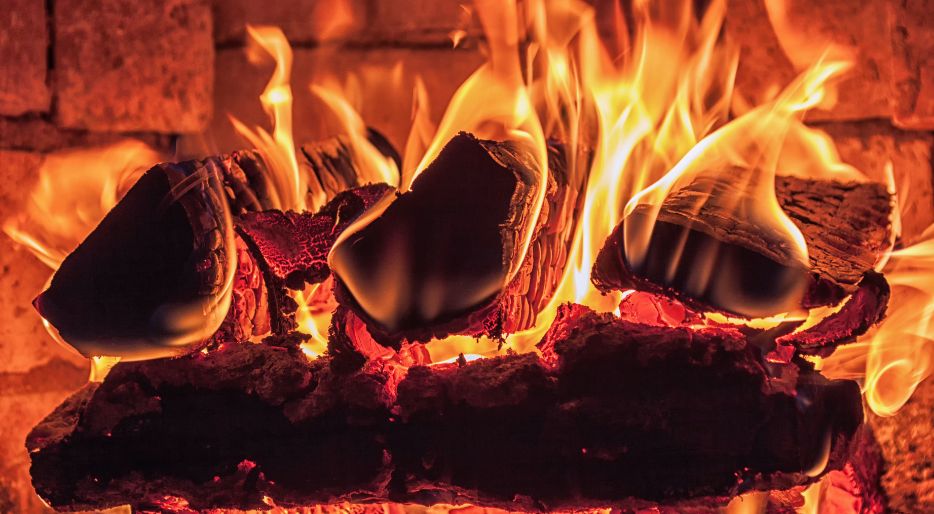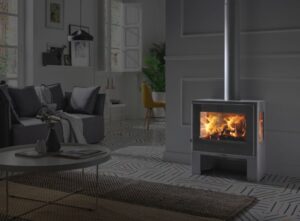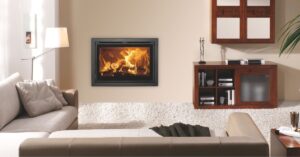
Hygge isn’t a season, it’s a way of being in the world We’ve been taught that fire is only lit when it’s cold.That the wood

The fireplace is one of the most traditional and cozy ways to heat a home. However, one of the most common concerns of the owners of these appliances is how much wood they consume.
How many kilos of wood are necessary to keep the fireplace burning for a night or a weekend? Is there any way to reduce wood consumption? In this post, we will answer these questions. In addition, we will provide useful information about the consumption of firewood in a fireplace.
By explaining the factors that influence firewood consumption and tips for reducing consumption, we hope to help you have a better understanding of how much firewood you consume and how to reduce that consumption. In addition, we will also provide useful information for anyone considering installing a wood-burning fireplace or stove in their home.
Firewood is a renewable energy, a friend of our planet, but we need to know how to use it and how to consume it. We tell you about it below!
There are different factors that affect the consumption of this fuel. These factors depend on the type of fireplace you have, i.e. whether it is open or closed. They also depend on the size of the appliance, the quality of the wood you use and the frequency of use.

One of the main factors affecting firewood consumption is the type of fireplace. There are two types: open and closed.
Therefore, an open fireplace requires more wood than a closed fireplace due to its larger size and lower efficiency.
This is a very influential aspect to take into account when calculating firewood consumption. The larger the size of the fireplace, the higher the consumption.
The reason for this is that a large fireplace will require more wood to heat a room of equal size than a small fireplace. This is because a large fireplace has a larger burning surface, which means it needs more wood to maintain the fire. In addition, large fireplaces usually have a larger wood storage capacity, which means that more wood will be required to fill it.
On the other hand, a small fireplace will require less wood to heat a room of equal size than a large fireplace. These types of appliances have a smaller combustion surface, so they need less fuel to maintain the fire.
The quality of the firewood can significantly affect the performance of the fireplace and, therefore, the consumption of firewood.
Poor quality firewood can have a high moisture content. This means that it has been improperly cut and stored. Wet firewood burns less efficiently because the water needs to be evaporated before the firewood can burn. This results in the need to use more wood to keep the fire burning. You can read more in our post “Wet firewood and its combustion problems“.
When we use proper firewood in our appliance this does not happen. Using properly cut and stored firewood, with a moisture content of less than 20% and not resinous, results in burning fuel more efficiently. Therefore, less wood is required to maintain the fire and its consumption is reduced.
When a fireplace is used frequently, more wood is required to keep the fire burning and to heat the space. In addition, more ash and debris will accumulate in the fireplace, requiring more cleaning and maintenance.

Although it is impossible to completely avoid wood consumption in a fireplace, there are several steps that can be taken to reduce wood consumption.
Some of the most effective ways to reduce wood consumption in a fireplace include:
In this post we have addressed the issue of wood consumption in a fireplace, and how to reduce it. It is important to know what factors affect wood consumption. In addition, you should know how to reduce firewood consumption for greater savings and efficiency.
As an additional point to what has already been mentioned, we recommend considering the use of a chimney thermometer to measure the temperature of the fire. It is also important to remember that it is necessary to use dry firewood, since wet firewood does not burn efficiently and requires more firewood.
In conclusion, wood consumption in a fireplace can be reduced through a series of appropriate measures and actions. If you have any questions or comments on this subject, do not hesitate to let us know, we will be happy to help you.

We hope this post has served as a guide. Take a look at our blog and find solutions and recommendations to help you with your fireplace or wood stove.
Visit our online store for Panadero wood stoves. If you have any questions or need help choosing the right stove, don’t hesitate to contact us. We will be happy to help you.
Articles of interest:
Did you like this article? If so, help us spread it 😊 . Click on the buttons below here and feel free to share it on your social networks!
Thank you for reading!
↓ ↓ ↓ ↓

Hygge isn’t a season, it’s a way of being in the world We’ve been taught that fire is only lit when it’s cold.That the wood

The afternoon of April 28, 2025, will be remembered by many: a total blackout left the entire Iberian Peninsula without power for hours. Trains halted,

Internships make all the difference when it comes to finding a job. Finding a job isn’t easy. But there’s one real, direct and effective path

Wood Stoves: The Warm Heart of Your Home Deserves Special Care. Wood stoves are much more than just a heating system—they are the soul of